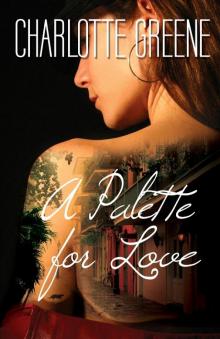- Home
- Charlotte Greene
A Palette for Love
A Palette for Love Read online
Table of Contents
Synopsis
Chapter One
Chapter Two
Chapter Three
Chapter Four
Chapter Five
Chapter Six
Chapter Seven
Chapter Eight
Chapter Nine
Chapter Ten
Chapter Eleven
Chapter Twelve
Chapter Thirteen
Chapter Fourteen
Chapter Fifteen
Chapter Sixteen
Chapter Seventeen
Chapter Eighteen
Chapter Nineteen
Chapter Twenty
Chapter Twenty-one
Chapter Twenty-two
Chapter Twenty-three
Chapter Twenty-four
Chapter Twenty-five
About the Author
Books Available from Bold Strokes Books
Synopsis
Art historian Chloé Devereaux needs a job, and she wants it to be in her hometown of New Orleans. She interviews for a position as an assistant at a prestigious art dealership run by the Winters Corporation—specifically, the beautiful, ruthless, and alluring Amelia Winters.
Amelia intrigues Chloé—and intimidates her. After she hires Chloé, Amelia insists that her assistant dress the part, and takes her on a whirlwind makeover and shopping spree. Before Chloé knows it, she is wearing designer clothes and barely recognizes herself in the mirror. Chloé’s friends and family are worried, and they warn her that Amelia is a lady killer. Chloé does her best to ignore them, reasoning that her relationship with Amelia is purely professional…or is it? Is Chloé’s growing regard for Amelia something more than friendship? Are her friends and family right? Should Chloé steer clear?
A Palette for Love
Brought to you by
eBooks from Bold Strokes Books, Inc.
http://www.boldstrokesbooks.com
eBooks are not transferable. They cannot be sold, shared or given away as it is an infringement on the copyright of this work.
Please respect the rights of the author and do not file share.
A Palette for Love
© 2016 By Charlotte Greene. All Rights Reserved.
ISBN 13: 978-1-62639-759-0
This Electronic Book is published by
Bold Strokes Books, Inc.
P.O. Box 249
Valley Falls, New York 12185
First Edition: November 2016
This is a work of fiction. Names, characters, places, and incidents are the product of the author’s imagination or are used fictitiously. Any resemblance to actual persons, living or dead, business establishments, events, or locales is entirely coincidental.
This book, or parts thereof, may not be reproduced in any form without permission.
Credits
Editor: Shelley Thrasher
Production Design: Susan Ramundo
Cover Design By Sheri ([email protected])
Chapter One
I’d been back in New Orleans only a few days now and wasn’t sure if I could trust the cabs to pick me up on time. My interview was scheduled for one p.m., but paranoid I’d miss it, I got to the warehouse where it was being held almost an hour early. It wasn’t in the best part of town, but I didn’t feel as if I was in danger, either. Like many parts of the city, it was a mixed-income neighborhood. Nice streets with manicured lawns and new paint alternated with rundown streets with boarded-up windows and trash in the yards. This part of Mid-City had been undergoing gentrification for the last decade, and the yuppies were buying the cheap shotguns and Victorians in blocks at a time, fixing them up, and selling them to other yuppies for ten times what they’d paid for them. In a few years, the entire neighborhood would be expensive.
I grew up in New Orleans, living mostly with my Aunt Kate after my parents died. I’d attended Loyola on a full scholarship, commuting from the Bywater by bus and streetcar all five years I was there. When I was accepted to a graduate arts program in Paris, I’d been happy and excited but found myself missing my home city more every year I was in Europe. Four years away had been too long, and I was happy to be back home, newly minted PhD in hand. I didn’t particularly love living with my aunt again, but what twenty-six-year-old would?
Because I was so early, I walked leisurely around the warehouse, which took up an entire city block. Artists around town had been hired to paint the outside of the building, and it was now a work of art on its own. Each side of the building was unique, sharing a different facet of the city’s culture and history. On a shorter side facing one street, shadowy outlines of jazz musicians played visual music on Spanish-style balconies painted onto the building’s metal siding. On the next side, antebellum ladies and gentlemen danced in front of a faux plantation, enjoying the ill-gotten wealth of a bygone era. The back of the building, however, was the most interesting and puzzling, and had apparently been painted in direct reference to the plantation scene. There, slaves stood near shanties and shacks, looking longingly in the direction of the dancing scene on the next side of the building. Why is this hidden back here? I wondered. Wishing I’d remembered to bring a camera, I made my way around a cluster of trashcans to the final side of the building and was surprised to see several people on scaffolding and ladders working on the last painting. They all looked over at me curiously, and I flushed under their gaze. Turning around, I returned to the slave scene and stood as far away from it as I could, trying to take it all in.
“It’s beautiful, isn’t it?” someone asked.
I jumped and then turned toward the voice, surprised to see an elegantly dressed woman standing near the trashcans. She was about my age, her dark hair pulled up in a severe, no-nonsense French braid. She wore pearls around her neck and at her ears, and the style and cut of her clothes suggested a former era. Her makeup was impeccable, and she wore square but flattering glasses. Standing by the rubbish and trashcans of the alley, with her smart clothes and refined looks, she looked altogether as incongruous in this setting as possible.
“It’s incredible,” I managed to say.
“You looked puzzled a moment ago. Is something wrong with it?”
“Nothing, and that’s why I’m puzzled. I don’t understand why it’s hidden away back here. This is clearly the best mural. It’s shocking and thought-provoking.”
She shrugged. “That’s exactly what I thought. Unfortunately, I had no say in the matter. If it were up to me, the entire building would be covered with this scene, all those accusing eyes directed at the city around them. The city commission decided otherwise.”
“I supposed that makes sense. Few people like talking about this part of the city’s past.” I indicated the scene.
“Especially if tourists might see it.”
We stood there for a while smiling at each other before she seemed to shake herself awake. “How rude of me.” She walked closer and held out a hand. “I’m Amelia Winters.”
Amelia Winters was the woman interviewing me at one. I swallowed, my hand trembling as I shook hers. “Clothilde Deveraux.”
“Miss Deveraux—or should I say Doctor Deveraux—I’m so happy to meet you. We had a meeting arranged for later today, correct?”
“Yes. I got here early. So sorry to intrude. Oh, and Miss or Doctor, whatever you prefer.”
“It’s not a problem at all, Doctor. In fact, I’m rather relieved. An important client is calling from Paris this afternoon, and I was afraid it would intrude on our conversation later. Now we’ll have ample time to get to know one another.”
Still embarrassed that I was here so early, I wasn’t certain whether she was being truthful or accommodating, and I blushed. “Thank you for being so obliging, Mi
ss Winters. I wasn’t sure how long it would take to get here, and I wanted to see the warehouse beforehand.”
“Let’s move inside, shall we? I’ll ask one of the interns to prepare some tea.”
I followed her around to a door into the warehouse, which doubled as the door to the plantation house on the painted scene. She entered a code on the keypad by the door, and it opened for us automatically. After my eyes adjusted to the dim light, I caught my breath. Inside was a treasure trove of artwork in various conditions. Several paintings on easels were set up around the room, some with serious-looking people seated before them, examining the work closely or working on it with brushes and feathers. Artwork hung on the walls, covering nearly every available space, and I recognized several contemporary French paintings mixed in with some unfamiliar work. Elsewhere, paintings were partially boxed as if waiting for shipment or further opening. In the far end of the room, statues stood on wooden platforms, some wrapped with packing materials and others open for viewing.
Seeing my stunned expression, Miss Winters said, “Feel free to explore for a few minutes while I get your file ready for the interview. I’ll come get you when I’m ready.”
“Thank you. I didn’t mean to gawk.”
“That’s what you’re here for, Doctor. I’ll see you soon.” She turned and disappeared into an office in one corner of the building.
I spent the next twenty minutes doing just what she’d suggested: exploring. As the time passed, I grew increasingly impressed by what I was seeing. Amelia Winters was one of the best-known art dealers in the country, particularly the South, but I’d had no idea the scale of her enterprise. Literally millions of dollars’ worth of art was sitting around in this one room, and, I noticed, it looked like there was another floor of it above us. I watched some of the art restorers working on older paintings for a moment, shocked even further that this enterprise could afford to retain so many of them. At least ten people were restoring works of art, and other, unmanned paintings on easels were clearly undergoing restoration as well. What I took as her personal collection—the art on the walls—was also awe-inspiring. Besides the contemporary French painters, French masterworks from the eighteenth and nineteenth century were scattered here and there, restored to pristine condition. Looking longingly at the boxed work I had yet to see, I walked over to the lone security guard, curious.
“Hello,” I said as I approached. “I’m sorry to bother you.”
He stood up from his chair to greet me. “Not at all.”
“I was just wondering about the security systems here. This place is larger than some museums I’ve interned in.”
He smiled. “We have more security than you’d know just looking around, miss,” he said. “We have state-of-the-art video surveillance in every corner of the building, as well as myself and another armed guard upstairs. Police monitor this building at all times, and we’re never more than twenty seconds from a patrol car.”
I nodded but found myself wondering if that would be enough. If thieves decided to come in here, they would find a treasure chest. “But surely more could be done,” I said. “Everything in here is a priceless, irreplaceable masterpiece.” I gestured around me.
“I wouldn’t go so far as to say that,” Amelia Winters said from behind me, and I jumped. She smiled when I turned toward her. “Some of the work here is true garbage, I would argue, but my clients asked me to get it for them.” She looked over at the security guard. “Getting grilled, Henry?”
Embarrassed to be found criticizing her employees, I began to stammer. “I’m sorry—”
“Please don’t apologize. I was concerned about security too, which is precisely why I hired the best security firm in New Orleans. You’ll learn all about it soon.”
I gave a great heave of relief as she said this, as it suggested that she meant to hire me. I smiled sheepishly at Henry. “I really didn’t mean to imply—”
“Don’t mention it.” He winked.
“Now, Doctor Deveraux, if you’d be so kind?” Miss Winters said, indicating her office. “I’d like to begin the interview.”
For its size, the office was nicely decorated, the furniture mainly art-deco antiques. Miss Winters indicated a chair a couple of feet from her desk. I sat and placed my purse on the ground, and she handed me a cup of tea before sitting on the front edge of her desk, gazing down at me. She was quiet for quite a while, just looking. After a long moment, I began to heat up with embarrassment under her gaze, unsure how to respond to her stare.
Finally, she smiled. “Please forgive me,” she said. “I don’t mean to make you uncomfortable, Doctor.” She stood and went around the side of the desk, sitting in her chair. She opened a manila folder, which, I noticed, was one of many on her desk. My stomach dropped as I realized the other folders represented my competition. She flipped through my file a couple of times, nodding as she read, then returned to my C.V.
“Clothilde Deveraux.” She looked up at me. “What a fantastic, old-fashioned name. French, right?”
Unexpected as it was, the question caught me off guard, reminding me, once again, of how long it had been since I’d been interviewed. “Yes. French Creole.” I tried to swallow my nervousness. “Clothilde is a family name. My friends call me Chloé.”
“Clo-ee,” she said slowly, nodding. “And the name Deveraux is very common in New Orleans.”
“Yes—I have a lot of close and distant family here and in other parts of Louisiana.”
“I can imagine.” She sat back and removed her glasses, revealing a pair of startlingly dark-blue eyes. “My family is also from here.”
“Yes.” The Winters family was known for its money, its reign stretching back as far as the history of the city. An area of mansions in the Garden District belonged entirely to the Winters clan.
“We’re not Creole, of course. English interlopers, I’m afraid.”
Not sure what response she expected, or whether she was making a joke, I smiled nervously in reply.
“Soooo.” She put her glasses back on and looked back down at my file. “BFA and MA from Loyola University here in New Orleans, and a PhD in French Art History from the Sorbonne. Summer internships with museums including the Art Institute of Chicago, the San Francisco Modern Art Museum, and, most recently, the Musée d’Art Moderne in Paris.” She took her glasses off again and looked up at me once more, obviously puzzled. “Doctor Deveraux, you are perhaps the most overqualified person I have ever interviewed for a position with my establishment. You make my experience and education look sad and paltry by comparison. Why on earth do you want to work for me?”
I swallowed. Although I’d spent several hours yesterday preparing for this interview, somehow the idea of justifying my application had slipped my mind. I’d been desperately trying to get back to New Orleans for some time now. Academic positions at New Orleans’s universities were very difficult to come by, particularly with the current recession. None of this, however, explained why I’d applied, and it wouldn’t be smart to say that the job I really wanted wasn’t available right now. Thinking as quickly as I could, I came up with an idea.
“In Paris last year, I went to an exhibit of Jean-Claude Sasseur.”
“Mmmm, I love his work. I was there myself.”
“Exactly. I missed meeting you, but I saw the results of your meeting with him. You bought five of his paintings.”
Miss Winters raised her eyebrows in reply but said nothing.
“Later that same month, I went to a photography exhibit by Madeline Allemand and the same thing happened, only there you nearly bought out the show.”
She remained silent, her eyes unreadable.
“The same thing happened with Adrienne Bayle, Guy Montagne, Cerise Payan, and others. At every show I attended last year, you bought something.”
Miss Winters sat forward, resting on her forearms. “Let’s be frank, Doctor Deveraux.”
I nodded, heart sinking because of her serious expression.
&
nbsp; “You have been groomed to work in the academy or a museum. Every bit of information I have on you here suggests that fact. I see no work in galleries or art dealerships in your file whatsoever. If you had told me you were seeking a career change, I still wouldn’t believe you. Not after all your hard academic work and training.”
I swallowed and agreed.
“But you didn’t say that. Instead, you suggested that my purchases impressed you, which is something altogether different.”
I said nothing, realizing she had caught me.
“Do you want to know what I think? I think you wanted—perhaps desperately—to come back home, and you’re willing to do anything to make that happen.”
I was stunned. She was, of course, completely right.
“I think you want very much to work at Loyola or Tulane, or perhaps the state college, but with all of these hiring freezes, nothing is available for you in the schools here. Am I right?”
Ashamed and disheartened, I nodded.
Instead of getting upset, she said, “There’s nothing wrong with that, Doctor Deveraux, and in fact, I would have liked to have known your motives coming in, as they work in my favor. You’re not likely to leave until an academic position opens up for you here in the city, and in that regard, I believe I may be able to help you.”
“Excuse me? What do you mean?”
She sat up in her chair. “The Winters family is one of the largest private contributors to Tulane University. My company is one of Tulane’s largest corporate contributors. If I want you on the faculty there, it’ll happen. Maybe next year, maybe the year after that, depending on what I can do. Do you understand me, Doctor?”
The realization that she might have enough influence to get me an academic position startled me. Stunned, I had no reply.
“That is, of course, if we can reach an agreement as to your tenure with me. And who knows—you might like working here more than you know.” She leaned back in her chair, hands steepled beneath her chin, staring at me. Her gaze was probing, and I flushed with embarrassed warmth again, still not certain how to respond to her inquiring gaze. Finally, she said, “Yes, I think you’ll do nicely. Very nicely indeed.” She paused and then sat forward again, meeting my eyes. “Do you know what this job is?”

 On the Run
On the Run From the Woods
From the Woods Gnarled Hollow
Gnarled Hollow Pride and Porters
Pride and Porters A Palette for Love
A Palette for Love Canvas for Love
Canvas for Love